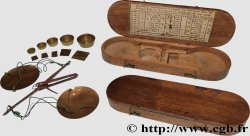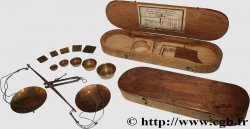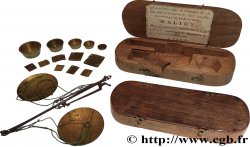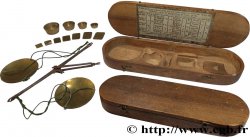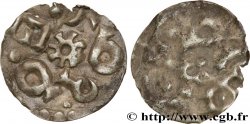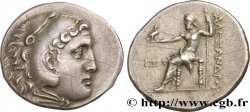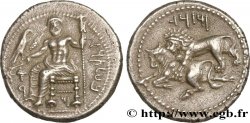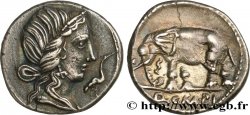Live auction - bry_539884 - SCALE Boîte avec 12 poids du balancier Courseul fin XVIIIe siècle Namur
You must signin and be an approved bidder to bid, LOGIN TO BID. Accounts are subject to approval and the approval process takes place within 48 hours. Do not wait until the day a sale closes to register. Clicking on "BID" constitutes acceptance of the terms of use of cgb.fr private live auctions.
Bids must be placed in whole Euro amounts only. The sale will start closing at the time stated on the item description; any bids received at the site after the closing time will not be executed. Transmission times may vary and bids could be rejected if you wait until the last second. For further information check the Live auction FAQ
All winning bids are subject to a 18% buyer’s fee.
All winning bids are subject to a 18% buyer’s fee.
| Estimate : | 800 € |
| Price : | no bid |
| Maximum bid : | no bid |
| End of the sale : | 03 December 2019 19:59:17 |
Type : Boîte avec 12 poids du balancier Courseul
Date: (1800-1862)
Date: fin XVIIIe siècle
Mint name / Town : Namur
Diameter : 98 mm
Orientation dies : 12 h.
Weight : 384 g.
Rarity : R2
Coments on the condition:
Bel état de conservation malgré des taches noires et rayures sur la boîte
Catalogue references :
Obverse
Reverse
Commentary
Nous classons cette boîte comme fabriquée par Courseul aux vues des grandes similitudes entre celle-ci et celle illustrée dans l’ouvrage de Garault page 131.
Boîte de production française (Namur fait partie intégrante de la France révolutionnaire au moment du début de fabrication de ce type de boîte) avec une étiquette imprimée : “POIDS DES MONNOIES, Douze grains d’or valent 2 tr. Six grains valent 1 fr. Un grain vaut 3 sols 4 deniers. Les divisions pr. l’argent, 5 liards pour 6 grains”, probablement de la fin du XVIIIe siècle. Des étiquettes imprimées sont visibles et indiquent l’emplacement de chaque poids.
Les poids, en forme de tronc de cylindre à bouton, sont d’origine avec : l’écu de 6 livres (29,33g), l’écu de 3 livres, le souverain (11,09g), le Guinée (8,49g), le double Louis vieux (16,36g), le Louis vieux (8,18g), le Ducat (3,52g), l’Ecu de 5 francs (25,16g), la pièce de 40 francs (12,93g), la pièce de 20 francs (6,45g), le double Louis neuf (15,39g) et le Louis neuf (7,68g).
Tous les poids sont contremarqués au dessous d’un lis (ou d’une fleur à trois pétales). Sous le petit couvercle, vous retrouverez 4 fines lamelles poinçonnés d’annelets pointés, soit des lamelles pour 4, 5, 6 et 12 grains. Il manque 5 fines lamelles, car habituellement on est censé en trouver 9. La boîte, en bois clair et fermée par deux attaches métalliques, est quasi complète car il manque une partie des fines lamelles qui se comptent habituellement au nombre de 9. Le fléau de la balance est à double trou plat.
Dimensions de la boîte : 98*167 mm.
We classify this box as manufactured by Courseul in view of the great similarities between it and the one illustrated in Garault's work page 131.
French production box (Namur was an integral part of revolutionary France at the time this type of box began to be manufactured) with a printed label: “WEIGHT OF COINS, Twelve grains of gold are worth 2 tr. Six grains are worth 1 franc. One grain is worth 3 sols 4 deniers. The divisions pr. money, 5 liards for 6 grains”, probably from the end of the 18th century. Printed labels are visible and indicate the location of each weight.
The weights, in the shape of a button cylinder trunk, are original with: the 6-pound ecu (29.33g), the 3-pound ecu, the sovereign (11.09g), the Guinea (8.49g), the double old Louis (16.36g), the old Louis (8.18g), the Ducat (3.52g), the 5-franc Ecu (25.16g), the 40-franc piece (12.93g), the 20-franc piece (6.45g), the double new Louis (15.39g) and the new Louis (7.68g).
All weights are countermarked below a lily (or a three-petaled flower). Under the small lid, you will find 4 thin strips punched with pointed rings, i.e. strips for 4, 5, 6 and 12 grains. There are 5 thin strips missing, because usually we are supposed to find 9. The box, made of light wood and closed by two metal fasteners, is almost complete because some of the thin strips, which usually number 9, are missing.. The balance beam has a double flat hole.
Box dimensions: 98*167 mm
Boîte de production française (Namur fait partie intégrante de la France révolutionnaire au moment du début de fabrication de ce type de boîte) avec une étiquette imprimée : “POIDS DES MONNOIES, Douze grains d’or valent 2 tr. Six grains valent 1 fr. Un grain vaut 3 sols 4 deniers. Les divisions pr. l’argent, 5 liards pour 6 grains”, probablement de la fin du XVIIIe siècle. Des étiquettes imprimées sont visibles et indiquent l’emplacement de chaque poids.
Les poids, en forme de tronc de cylindre à bouton, sont d’origine avec : l’écu de 6 livres (29,33g), l’écu de 3 livres, le souverain (11,09g), le Guinée (8,49g), le double Louis vieux (16,36g), le Louis vieux (8,18g), le Ducat (3,52g), l’Ecu de 5 francs (25,16g), la pièce de 40 francs (12,93g), la pièce de 20 francs (6,45g), le double Louis neuf (15,39g) et le Louis neuf (7,68g).
Tous les poids sont contremarqués au dessous d’un lis (ou d’une fleur à trois pétales). Sous le petit couvercle, vous retrouverez 4 fines lamelles poinçonnés d’annelets pointés, soit des lamelles pour 4, 5, 6 et 12 grains. Il manque 5 fines lamelles, car habituellement on est censé en trouver 9. La boîte, en bois clair et fermée par deux attaches métalliques, est quasi complète car il manque une partie des fines lamelles qui se comptent habituellement au nombre de 9. Le fléau de la balance est à double trou plat.
Dimensions de la boîte : 98*167 mm.
We classify this box as manufactured by Courseul in view of the great similarities between it and the one illustrated in Garault's work page 131.
French production box (Namur was an integral part of revolutionary France at the time this type of box began to be manufactured) with a printed label: “WEIGHT OF COINS, Twelve grains of gold are worth 2 tr. Six grains are worth 1 franc. One grain is worth 3 sols 4 deniers. The divisions pr. money, 5 liards for 6 grains”, probably from the end of the 18th century. Printed labels are visible and indicate the location of each weight.
The weights, in the shape of a button cylinder trunk, are original with: the 6-pound ecu (29.33g), the 3-pound ecu, the sovereign (11.09g), the Guinea (8.49g), the double old Louis (16.36g), the old Louis (8.18g), the Ducat (3.52g), the 5-franc Ecu (25.16g), the 40-franc piece (12.93g), the 20-franc piece (6.45g), the double new Louis (15.39g) and the new Louis (7.68g).
All weights are countermarked below a lily (or a three-petaled flower). Under the small lid, you will find 4 thin strips punched with pointed rings, i.e. strips for 4, 5, 6 and 12 grains. There are 5 thin strips missing, because usually we are supposed to find 9. The box, made of light wood and closed by two metal fasteners, is almost complete because some of the thin strips, which usually number 9, are missing.. The balance beam has a double flat hole.
Box dimensions: 98*167 mm







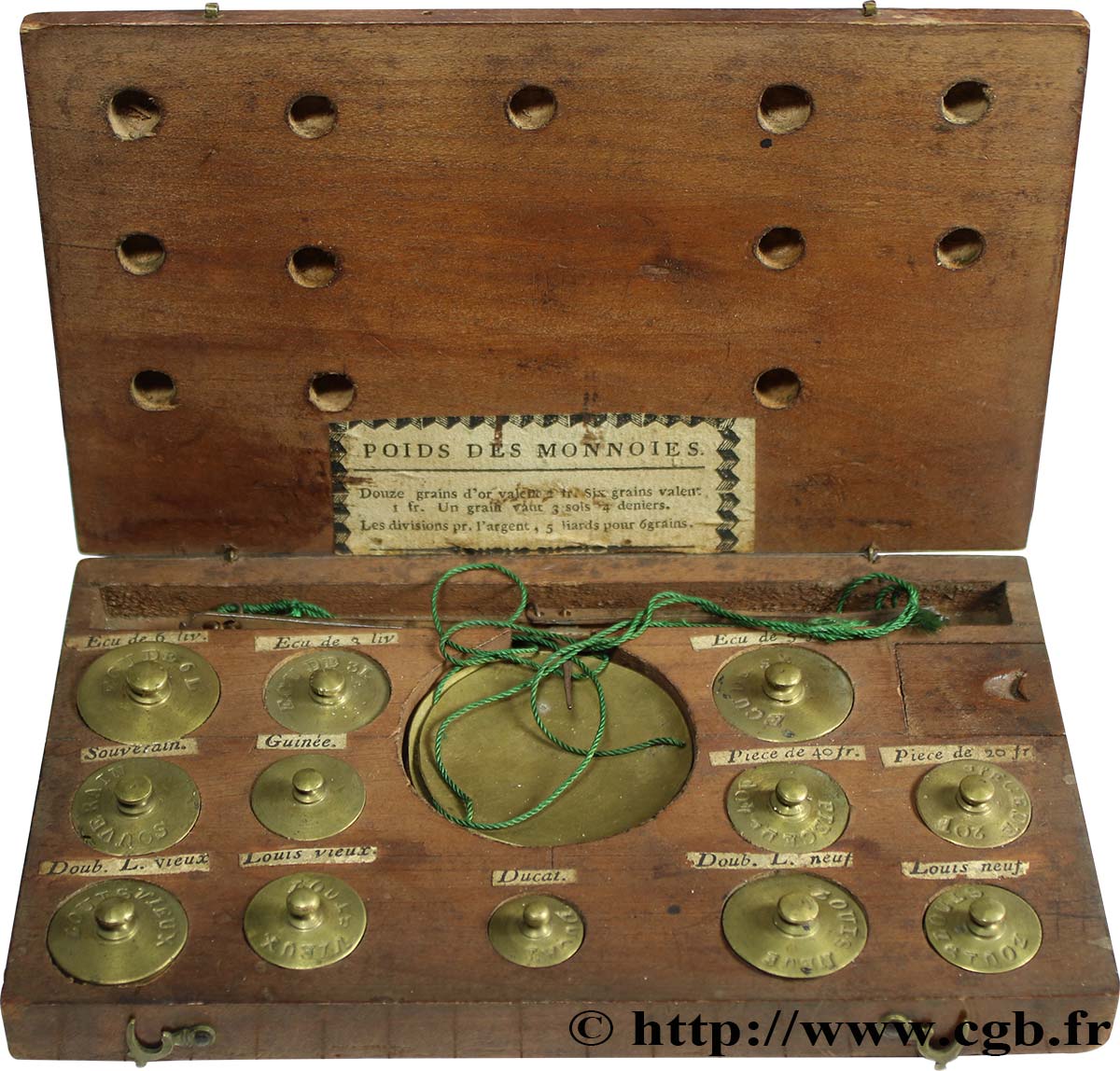
 Report a mistake
Report a mistake Print the page
Print the page Share my selection
Share my selection Ask a question
Ask a question Consign / sell
Consign / sell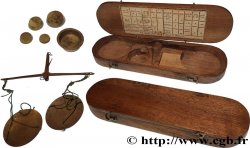
 Full data
Full data
